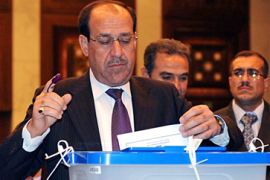Iraqi PM pulls ahead of poll rivals
Preliminary figures confirm strong lead for State of Law, followed by Iyad Allawi’s Iraqiya.

Early poll results in Iraq’s national elections show a strong lead for State of Law, the bloc led by Nouri al-Maliki, the prime minister, with about two-thirds of the total votes counted.
The coalition is ahead in oil-rich Basra and Karbala, two of Iraq’s three biggest provinces, which have Shia Muslim majorities.
| special report |
 |
Al-Maliki’s State of Law is also holding on to leads in Baghdad, whose 70 seats account for more than a fifth of Iraq’s 325-member Council of Representatives, as well as Babil, Najaf, Wasit and Muthanna.
The poll results have put Iyad Allawi, the head of Iraqiya, a cross-sectarian bloc, ahead in the disputed oil-rich province of Kirkuk, against the expectations of analysts who had predicted it would probably be won by a Kurdish bloc.
Allawi is also leading in the Sunni-majority region of Anbar, Iraq’s largest province geographically.
Fraud claims
Anita McNaught, Al Jazeera’s correspondent in Baghdad, said: “We’re now seeing two-thirds of the votes counted across the country’s 18 provinces … but those results do not place us in a position whereby we can see who will come out ahead in the end.
“Now, the parties behind the scenes will be guessing how well they are doing ahead of the process of deciding who will sit with who to form a voting bloc big enough to form the government.”
The results of the March 7 elections have been overshadowed by more than 300 complaints of fraud from within Iraq and overseas, which are being investigated by the electoral commission.
 |
| Baghdad’s vote tally as of Monday night |
Al-Maliki has dismissed the allegations, which have come largely from opposition blocs.
“We should all believe the election was handled in nothing but a respectful manner and we should comply with its results,” he said.
But al-Maliki conceded that “there were some cases of fraud, but it has not been enough to upend the election process”.
Election officials also downplayed the claims despite some polling stations in Kirkuk experiencing such a high level of fraud that ballots were nullified.
“Voting anomalies in Kirkuk have been so serious in some polling stations that they have cancelled them,” Al Jazeera’s McNaught said.
“They have found that there were more votes in the ballot boxes than there were voters on the polling list there,” Faraj al-Haidari, who heads the national election commission, said.
He said that the number of complaints in the general election was less than half that of provincial polls in January last year.